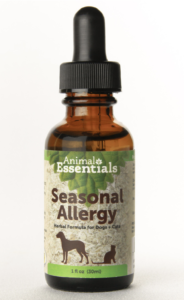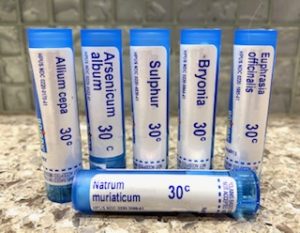Getting Results For Cats With Seasonal Allergies

And so it begins. Spring is officially in full bloom in many parts of the country! This can be a welcomed sight for many people who are ready to say goodbye to winter. However, if you have a cat with seasonal allergies you’re probably saying something like, “Oh no…here we go again!” I had several clients reach out to me on the last day of February because their cats were already symptomatic! OMG…the struggle is real, folks.
Rocket’s challenge with seasonal allergies
I understand their concerns. Our cat, Rocket, has struggled with seasonal allergies for several years. In fact, his condition became so inflammatory that he developed a nasal polyp that had to be surgically removed in 2017. Since then I have been doing everything I can to help prevent it from redeveloping.
Just a couple of weeks ago I started him on an herbal product by Animal Essentials called Seasonal Allergy. Fortunately for me, Rocket loves to eat anything–even medicine and supplements. He licks the 1/4 ml dose off the lid of a baby food jar with a tiny bite of baby food as if it’s his favorite treat. Licks it clean. The key is giving the herbal away from meals because it’s better absorbed.
Whenever the wind blows even the slightest amount of dust or pollen in our area I usually end up using a homeopathic remedy to address the symptoms. Surprisingly, by adding Seasonal Allergy, too, the results have been nothing less than stunning! With tree pollens like oak, juniper and hackberry running extremely high on the charts here (www.pollen.com), he has NO symptoms of allergies! Not one sniffle, sneeze, watery eyes or runny nose.
Seasonal allergy recommendations for cats
Seasonal allergies don’t have to be a struggle for your cat. There are many natural ways to provide support through supplements, homeopathy and herbal medicines. In our home we have used lots of things to address and alleviate allergy symptoms and complications. Here are several things you can do to boost the immune system and provide respiratory support for cats who struggle with seasonal allergies.
Herbal support to balance the immune system
The power of plants to heal and support the body is simply amazing. Herbal remedies can provide systemic support to the body and help to keep the immune system in balance. Herbs like Astragalus, Eleuthero, Echinacea, Eyebright, Garlic, Turmeric, Licorice, Nettle, Olive Leaf, Oregon Grape, and Oregano are great immune system boosters. In addition, Elecampane, Plantain and Wild Cherry can provide respiratory support, too. Oftentimes it’s more beneficial to use a compound tincture due to the synergistic effect of multiple herbs. Milk thistle is a wonderful herb that not only helps support the liver during allergy season but also helps promote normal histamine release.
Homeopathy for seasonal allergy symptoms
Ever since Dr. Will Falconer taught me to use single homeopathic remedies I have been amazed at the results. Homeopathy is a gentle, non-toxic, holistic approach to address and rebalance the body’s vital force. It was developed by the father of homeopathy, Dr. Samuel Hahnemann, and is based on the premise of “like cures like,” For example, healthy people taking the remedies in great enough amounts actually cause the symptoms that a tiny dose would cure in a sick person exhibiting those same symptoms.
There are many great homeopathic options for seasonal allergies; the key is clueing in to the actual symptoms, both physically and emotionally. With cats it’s not always easy to read their emotions; however, it is easy to identify their physical symptoms. Below are several popular remedies recommended by the National Center of Homeopathy and Dr. Vikas Sharma for allergy symptoms in people. Remember, cats can experience many of the same type of symptoms:
- Arsenicum album: hay fever, sneezing, wheezing, nasal discharge; patient feels better in warm room
- Allium cepa: watery, itchy eyes, hay fever, sneezing, runny nose, tickle in throat, patient feels better in open air
- Bryonia: asthma
- Calcarea Carbonica: nasal/sinus congestion with trouble breathing due to asthma
- Natrum Muraticum: sinus congestion, stuffy nose, sneezing, excessive itching, irritable demeanor; Sabadilla is another remedy for similar symptoms including itchy eyes if Natrum Muraticum isn’t working
- Euphrasia: watery eyes, nasal discharge, coughing up phlegm
- Kali Phosphorica: excess nasal mucosa causing post nasal drip, drainage into the throat
- Urtica Urens: itchy skin due to sensitivity from things like grasses, weeds
- Sulphur: dry, itchy and/or burning skin, rashes
- Spongia Tosta: allergy symptoms with a cough
- Pulsatilla: allergies that result in a yellowish or green nasal discharge (possible upper respiratory or sinus infection)
Additional supplements to consider for seasonal allergies in cats
In addition to using herbal and homeopathic remedies, Dr. Karen Becker recommends some other ways to provide support for pets dealing with seasonal allergies. One is boosting the omega 3 fatty acids in the diet with a high quality, responsibly sourced oil like salmon, krill, tuna, anchovy and sardine. In addition, she recommends adding coconut oil, a good source of “lauric acid which has natural anti-fungal properties that can help suppress the production of yeast in your pet’s body. Omega-3 oils combined with coconut oil can moderate or even suppress the inflammatory response in allergic pets.”
Secondly, Dr. Becker also recommends using “quercetin, which is a bioflavonoid with anti-inflammatory, antioxidant and antihistamine properties. I call it “nature’s Benadryl,” because it’s very effective at suppressing histamine release.”
Additional ways Dr. Becker recommends helping pets with seasonal allergies include:
- Eliminating a processed food diet because it’s inflammatory and further weakens the immune system
- Avoiding unnecessary vaccinations because they stimulate the immune system further
- Foot soaks, frequent bathing, and eye rinses
- Minimizing indoor allergens as much as possible
Addressing the root cause with muscle testing, energy healing
One thing that is often overlooked is the issue of gut health–or perhaps, lack thereof. Essentially, if we have an allergy issue we have a gut issue. Keep in mind, the immune system is located in the gut, so the question becomes, what is contributing to the imbalance here?
Some of the most common things that damage the gut include vaccines, heavy metals, flea and tick medications, glyphosate exposure, steroids, medications, fluoride in water and other environmental toxins like cleaning products, air fresheners, and even endocrine disrupting chemicals. If your cat has been exposed to any of these the first thing to do is removing anything from the environment that is on the list. Next, discontinue using if possible whatever is on this list. Thirdly, take steps to remove these toxins from the body’s tissues and organs with a complete detox protocol. Lastly, use specific supplements, foods, and nutraceuticals that restore the gut lining, reduce inflammation, and rebuild and balance the microbiome.
Finally, one of the things I do is to determine what the cat is allergic to by muscle testing. For example, it could be dust, trees, weeds, flowers, or grasses. Checking sites like www.pollen.com can identify prevalent allergens where you live. Moreover, using energy healing work, I can energetically clear the stressor at the cellular level. This stops the body from reacting stressfully, and it is able to rebalance and heal.
Dealing with seasonal allergies in cats doesn’t have to be a constant struggle. When you implement the various ways to provide ongoing immune system support and addressing the symptoms quickly with a natural, holistic approach, you will be amazed at the results!
If your cat is struggling with seasonal allergies and you need my help with energy work, please reach out!



